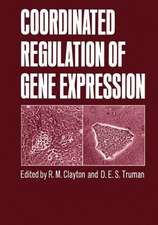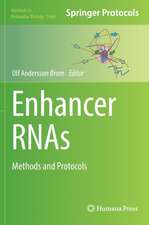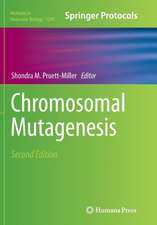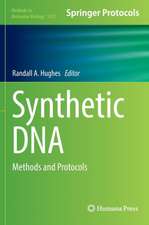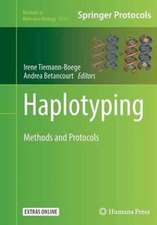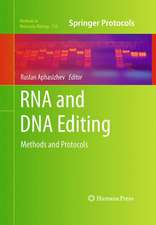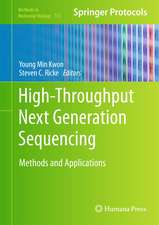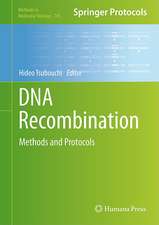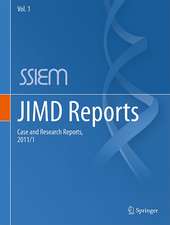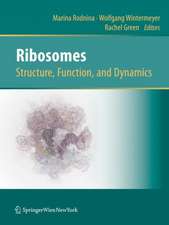X-Chromosome Inactivation: Methods and Protocols: Methods in Molecular Biology, cartea 1861
Editat de Takashi Sadoen Limba Engleză Hardback – 15 sep 2018
Authoritative and cutting-edge, X-Chromosome Inactivation: Methods Protocols aims to be useful for researchers in the field of epigenetics, chromatin, noncoding RNA, and nuclear architecture.
| Toate formatele și edițiile | Preț | Express |
|---|---|---|
| Paperback (1) | 712.95 lei 38-44 zile | |
| Springer – 10 dec 2019 | 712.95 lei 38-44 zile | |
| Hardback (1) | 1104.68 lei 6-8 săpt. | |
| Springer – 15 sep 2018 | 1104.68 lei 6-8 săpt. |
Din seria Methods in Molecular Biology
- 9%
 Preț: 791.63 lei
Preț: 791.63 lei - 23%
 Preț: 598.58 lei
Preț: 598.58 lei - 20%
 Preț: 882.98 lei
Preț: 882.98 lei -
 Preț: 252.05 lei
Preț: 252.05 lei - 5%
 Preț: 802.70 lei
Preț: 802.70 lei - 5%
 Preț: 729.61 lei
Preț: 729.61 lei - 5%
 Preț: 731.43 lei
Preț: 731.43 lei - 5%
 Preț: 741.30 lei
Preț: 741.30 lei - 5%
 Preț: 747.16 lei
Preț: 747.16 lei - 15%
 Preț: 663.45 lei
Preț: 663.45 lei - 18%
 Preț: 1025.34 lei
Preț: 1025.34 lei - 5%
 Preț: 734.57 lei
Preț: 734.57 lei - 18%
 Preț: 914.20 lei
Preț: 914.20 lei - 15%
 Preț: 664.61 lei
Preț: 664.61 lei - 15%
 Preț: 654.12 lei
Preț: 654.12 lei - 18%
 Preț: 1414.74 lei
Preț: 1414.74 lei - 5%
 Preț: 742.60 lei
Preț: 742.60 lei - 20%
 Preț: 821.65 lei
Preț: 821.65 lei - 18%
 Preț: 972.30 lei
Preț: 972.30 lei - 15%
 Preț: 660.49 lei
Preț: 660.49 lei - 5%
 Preț: 738.41 lei
Preț: 738.41 lei - 18%
 Preț: 984.92 lei
Preț: 984.92 lei - 5%
 Preț: 733.29 lei
Preț: 733.29 lei -
 Preț: 392.60 lei
Preț: 392.60 lei - 5%
 Preț: 746.26 lei
Preț: 746.26 lei - 18%
 Preț: 962.66 lei
Preț: 962.66 lei - 23%
 Preț: 860.22 lei
Preț: 860.22 lei - 15%
 Preț: 652.64 lei
Preț: 652.64 lei - 5%
 Preț: 1055.50 lei
Preț: 1055.50 lei - 23%
 Preț: 883.87 lei
Preț: 883.87 lei - 19%
 Preț: 491.89 lei
Preț: 491.89 lei - 5%
 Preț: 1038.86 lei
Preț: 1038.86 lei - 5%
 Preț: 524.16 lei
Preț: 524.16 lei - 18%
 Preț: 2122.34 lei
Preț: 2122.34 lei - 5%
 Preț: 1299.23 lei
Preț: 1299.23 lei - 5%
 Preț: 1339.12 lei
Preț: 1339.12 lei - 18%
 Preț: 1390.26 lei
Preț: 1390.26 lei - 18%
 Preț: 1395.63 lei
Preț: 1395.63 lei - 18%
 Preț: 1129.65 lei
Preț: 1129.65 lei - 18%
 Preț: 1408.26 lei
Preț: 1408.26 lei - 18%
 Preț: 1124.92 lei
Preț: 1124.92 lei - 18%
 Preț: 966.27 lei
Preț: 966.27 lei - 5%
 Preț: 1299.99 lei
Preț: 1299.99 lei - 5%
 Preț: 1108.51 lei
Preț: 1108.51 lei - 5%
 Preț: 983.76 lei
Preț: 983.76 lei - 5%
 Preț: 728.16 lei
Preț: 728.16 lei - 18%
 Preț: 1118.62 lei
Preț: 1118.62 lei - 18%
 Preț: 955.25 lei
Preț: 955.25 lei - 5%
 Preț: 1035.62 lei
Preț: 1035.62 lei - 18%
 Preț: 1400.35 lei
Preț: 1400.35 lei
Preț: 1104.68 lei
Preț vechi: 1162.82 lei
-5% Nou
Puncte Express: 1657
Preț estimativ în valută:
211.41€ • 219.90$ • 174.53£
211.41€ • 219.90$ • 174.53£
Carte tipărită la comandă
Livrare economică 12-26 aprilie
Preluare comenzi: 021 569.72.76
Specificații
ISBN-13: 9781493987658
ISBN-10: 1493987658
Pagini: 215
Ilustrații: XI, 251 p. 53 illus., 43 illus. in color.
Dimensiuni: 178 x 254 mm
Greutate: 0.68 kg
Ediția:1st ed. 2018
Editura: Springer
Colecția Humana
Seria Methods in Molecular Biology
Locul publicării:New York, NY, United States
ISBN-10: 1493987658
Pagini: 215
Ilustrații: XI, 251 p. 53 illus., 43 illus. in color.
Dimensiuni: 178 x 254 mm
Greutate: 0.68 kg
Ediția:1st ed. 2018
Editura: Springer
Colecția Humana
Seria Methods in Molecular Biology
Locul publicării:New York, NY, United States
Cuprins
Screening for Factors Involved in X Chromosome Inactivation using Haploid ESCs.- Unbiased Genetic Screen to Identify Factors Involved in X-chromosome Inactivation Using a Pooled Bar-coded shRNA Library.- Unbiased Genetic Screen to Identify Factors Involved in X-chromosome Inactivation Using a Pooled Bar-coded shRNA Library.- Manipulation of Xist Imprinting in Mouse Pre-implantation Embryos.- Somatic Cell Nuclear Transfer in Mice — Basic Protocol and Its Modification for Correcting X Chromosome Inactivation Status.- Live Imaging of Xist RNA.- Live Imaging of X-chromosome Inactivation and Reactivation Kinetics.- Visualizing the Dynamics of Inactive X chromosomes in Living Cells Using Antibody-based Fluorescent Probes.- Visualization of Hidden Epitopes at the Inactive X Chromosome.- Chromosome Spread Analyses of Meiotic Sex Chromosome Inactivation.- Simultaneous RNA-DNA FISH in Mouse Pre-implantation Embryos.- Combined Immunofluorescence, RNA FISH and DNA FISH in Pre-implantation Mouse Embryos.- RNA-FISH and Immunofluorescence of Mouse Pre- and Post-implantation Embryos.- Experimental Analysis of Imprinted Mouse X-chromosome Inactivation.- X-chromosome Inactivation and Escape from X inactivation in Mouse.- Practical Analysis of Hi-C Data: Generating A/B Compartment Profiles.
Textul de pe ultima copertă
This book details recently developed technologies and conventionally employed cytological proceduresfor the study of X-Chromosome Inactivation. Chapters detail live imaging, bioinformatic methods, fluorescence in situ hybridization, and immunofluorescence, and procedures to optimize the study of molecular mechanism underlying X chromosome inactivation. Written in the highly successful Methods in Molecular Biology series format, chapters include introductions to their respective topics, lists of the necessary materials and reagents, step-by-step, readily reproducible laboratory protocols, and tips on troubleshooting and avoiding known pitfalls.
Authoritative and cutting-edge, X-Chromosome Inactivation: Methods Protocols aims to be useful for researchers in the field of epigenetics, chromatin, noncoding RNA, and nuclear architecture.
Authoritative and cutting-edge, X-Chromosome Inactivation: Methods Protocols aims to be useful for researchers in the field of epigenetics, chromatin, noncoding RNA, and nuclear architecture.
Caracteristici
Includes cutting-edge methods and protocols Provides step-by-step detail essential for reproducible results Contains key notes and implementation advice from the experts


